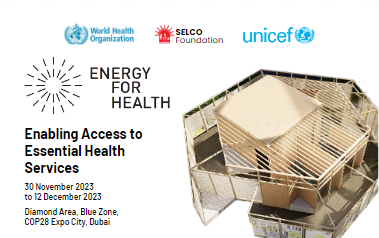“Electricity access in health-care facilities can make the difference between life and death,”
Dr Maria Neira, Assistant Director-General a.i, for Healthier Populations at WHO.
More than half of the world's population, i.e., about 4.5 billion people, are not fully covered by essential health services.
Almost 60% of healthcare facilities in 46 low and middle-income countries were found to have unreliable power
Every day almost 800 women die from preventable causes related to pregnancy and childbirth. A maternal death occurred almost every two minutes in 2020.

Decentralised renewable energy solutions can....
Reliable electricity in health-care facilities is critical to quality health-care provision, from managing childbirth and emergencies to immunization. Spotlights, suction units, oxygen concentrators, baby warmers, photo-therapy, vaccines refrigerators, diagnostic equipment and many other devices just cannot work without power.
Electricity is essential to ensure basic amenities, such as lighting, clean water supply, adequate ventilation, space heating and cooling, and communication as well as to enable telemedicine and remote care. Electricity access in rural and remote areas increases the sense of safety and security for patients and staff at night.
Despite the key role of reliable electricity in health-care facilities to achieve universal health coverage, 1 billion people in low- and lower-middle- income countries are still served by health- care facilities without reliable electricity or with no electricity access at all.

SELCO will be at COP28
SELCO, in partnership with WHO, will be hosting an activation on Energy for Health. Showcasing the challenges and solutions in the sector, in an experiential format. Do join us.
View Details